| Approach: Team |
Level:
Year 4
|
|
| Focus:
Stereotypes |
| Resources: 5 picture cards with statements, “Agree/Don’t Agree” chart, teacher recording sheet, “Working Together” card |
|
|
Questions/instructions:
Show and explain Working Together card.
Place pile of cards, upside down, on the table, with “Agree/Don’t Agree” chart.
For this activity, we have five cards. Each card says something that you may or may not agree with.
We’ll look
at one card at a time.
Show card number 8.
Here is the first one. It says “All New Zealanders should learn to speak Mäori.” Now (Student 1’s name), tell us if you agree or disagree with what this card says and try to tell us why you agree or disagree.
Repeat last statement for Student 2 to Student 4, so all students state their views.
I’ve listened to what each of you has said. Now it’s my turn to make up my mind. I agree that all New Zealanders should learn to speak Mäori. I’ll put the card on the chart to show that I agree.
Place card on “Agree” side of chart.
Now I’ll tell you why I agree. I agree because Mäori is a language that is special to New Zealand, so I think that we should all learn to use it. |
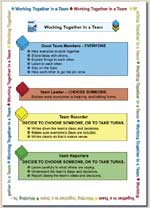
[Click on cards to enlarge.]
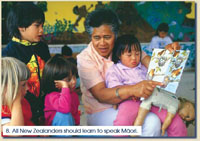
|
** Now it is (Student 1’s name) turn to take a card from the top of the pile. Tell all of us what is on the card, and show us the picture.
Student 1 reads card and shows picture.
Taking turns, each person is to say whether they agree or disagree. They also try to tell us why they agree or disagree.
Students 2 to 4 make their statements.
Now it is (Student 1’s name) turn to decide. Tell us if you agree or disagree, and put the card on the chart.
Student responds.
Now tell us why you agree or disagree.
Repeat the above steps (from ** ) with students 2, 3
and 4. [Click on cards below to enlarge.]
|
|
%
responses
2006 ('02) |
| y4 |
| Card 1: It’s OK for men to cry |
|

|
Final decision: |
agree |
96 (90) |
disagree |
3 (10) |
neither agree nor disagree |
1 (0) |
How well was the case
for that decision made?
|
extremely/very well |
0 (2) |
well |
13 (14) |
moderately well |
58 (51) |
poorly |
29 (33) |
| Card 2: Girls can be as good
as boys at playing rugby |
|
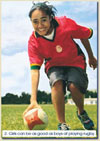
|
Final decision: |
agree |
90 (81) |
disagree |
8 (16) |
neither agree nor disagree |
2 (3) |
How well was the case
for that decision made?
|
extremely/very well |
2 (2) |
well |
20 (13) |
moderately well |
41 (47) |
poorly |
37 (38) |
| Card 3: Women rather than men
should do the cooking and housework |
|
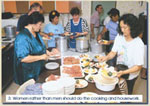
|
Final decision: |
agree |
21 (31) |
disagree |
74 (67) |
neither agree nor disagree |
5 (2) |
How well was the case
for that decision made?
|
extremely/very well |
0 (2) |
well |
18 (7) |
moderately well |
39 (63) |
poorly |
43 (28) |
| Card 4: Children in wheelchairs
should have their own schools |
|
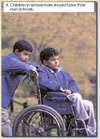
|
Final decision: |
agree |
51 (59) |
disagree |
46 (36) |
neither agree nor disagree |
3 (5) |
How well was the case
for that decision made?
|
extremely/very well |
4 (2) |
well |
19 (14) |
moderately well |
52 (50) |
poorly |
25 (34) |
|
Total
score: |
8–12
|
6 (6) |
6–7 |
15 (6) |
4–5 |
27 (30) |
2–3 |
35 (42) |
0–1 |
17 (16) |





